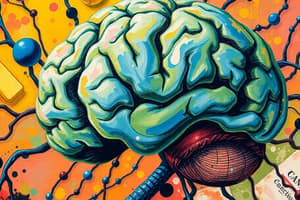Podcast
Questions and Answers
What are the primary factors contributing to drug addiction?
What are the primary factors contributing to drug addiction?
Genetic predisposition, environmental influences, and psychological factors.
How do neurotransmitters play a role in the development of drug addiction?
How do neurotransmitters play a role in the development of drug addiction?
They modulate brain reward pathways, reinforcing drug-taking behavior.
What are some common physical and psychological effects of drug addiction?
What are some common physical and psychological effects of drug addiction?
Physical effects can include changes in appetite and sleep disturbances, while psychological effects may consist of anxiety and depression.
In what ways can drug addiction impact an individual's social life?
In what ways can drug addiction impact an individual's social life?
What are effective strategies for preventing drug addiction?
What are effective strategies for preventing drug addiction?
Flashcards are hidden until you start studying
Study Notes
Factors Contributing to Drug Addiction
- Genetics: Predisposition to addiction can be inherited, influencing how individuals respond to drugs.
- Environment: Exposure to drugs, family history of addiction, and peer pressure can impact addiction risk.
- Mental health conditions: Depression, anxiety, and trauma can increase vulnerability to substance abuse.
- Age of first use: Using drugs at a young age can increase the likelihood of developing addiction.
- Drug type and method of use: Certain drugs, such as heroin and methamphetamine, are highly addictive due to their potent effects on the brain.
- Social and cultural factors: Societal norms and attitudes toward drug use play a role in addiction patterns.
Neurotransmitters and Drug Addiction
- Dopamine: Drugs like cocaine and methamphetamine increase dopamine levels in the brain's reward center, leading to intense pleasure and reinforcing addiction.
- Endorphins: Opioids like heroin and morphine mimic the effects of natural endorphins, producing pain relief and euphoria.
- Serotonin: Drugs like ecstasy and LSD affect serotonin levels, leading to altered mood, perception, and behavior.
- GABA: Alcohol and benzodiazepines enhance GABA activity, causing relaxation and sedation.
- Glutamate: Drugs like methamphetamine and PCP can disrupt glutamate signaling, leading to memory problems and cognitive impairment.
Physical and Psychological Effects of Drug Addiction
- Tolerance: Increased drug use requires larger doses for the same effect, leading to dependence.
- Withdrawal symptoms: Abrupt cessation of drug use can lead to uncomfortable and sometimes dangerous physical and psychological symptoms.
- Changes in brain structure and function: Prolonged drug use can alter the brain's reward system, impairing judgment and control over drug seeking behavior.
- Mental health issues: Substance abuse can trigger or worsen mental health problems such as depression, anxiety, and psychosis.
- Physical health complications: Drug addiction increases the risk of heart disease, stroke, liver disease, and respiratory problems.
Impact on Social Life
- Strained relationships: Addiction can damage family, friend, and romantic relationships.
- Social isolation: People with addiction may withdraw from social activities and isolate themselves.
- Financial problems: Substance abuse can lead to financial difficulties due to drug costs and loss of work productivity.
- Legal issues: Drug use and possession can result in arrests, fines, and imprisonment.
Strategies for Preventing Drug Addiction
- Education and awareness: Teaching youth about the risks and consequences of drug use.
- Early intervention and treatment: Providing access to mental health services and addiction treatment programs.
- Strong family and community support networks: Fostering healthy relationships and providing a supportive environment.
- Promoting healthy coping mechanisms: Encouraging alternatives to substance use, such as exercise, hobbies, and social activities.
- Reducing access to drugs: Implementing stricter control measures and laws related to drug availability.
Studying That Suits You
Use AI to generate personalized quizzes and flashcards to suit your learning preferences.




